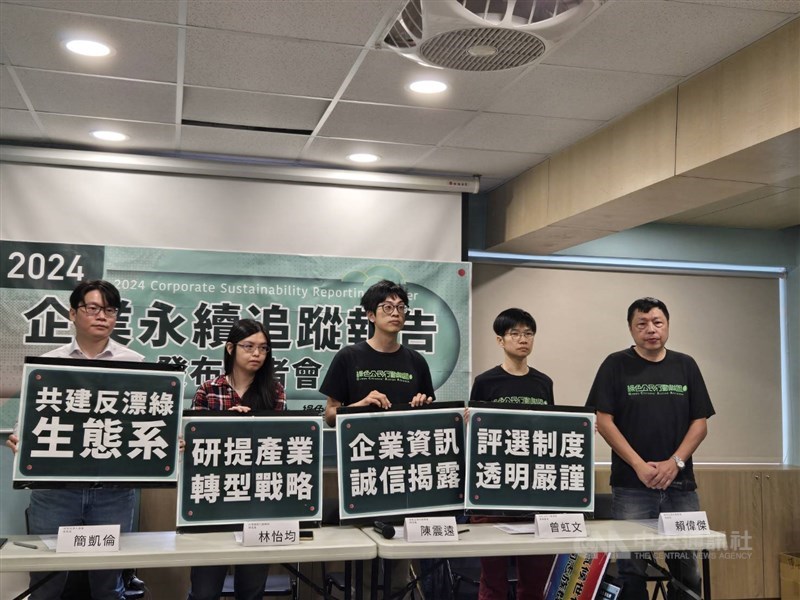
Taipei, May 2 (CNA) Taiwan's sustainability awards should have stricter criteria to avoid suspicions of "greenwashing," environmental groups said on Thursday, as they warned some industries, including semiconductors, could be a drag on Taiwan's effort to hit its carbon emissions reduction target.
Sustainability awards should have discernable criteria to boost their credibility and avoid suspicion of greenwashing, Green Citizens' Action Alliance Deputy Secretary-General Tseng Hung-wen (曾虹文) said during a press conference promoting a report, titled "2024 Corporate Sustainability Reporting Tracker," published by the groups in Taipei.
For example, she said, 12 of the 64 recipients of the Taiwan Corporate Sustainability Award (TCSA) in 2023 had been previously fined for pollution offences, including state-owned CPC Corporation, which was also found guilty of not disclosing all the facts.
Tseng said being law-abiding should be a basic requirement to be considered for such awards, rather than simply one of the evaluation criteria.
The National Sustainable Development Award, the only government-initiated sustainability award evaluated by the groups, allows companies' subsidiaries to be award participants and winners.
Tseng said this renders the award guilty of "spotlighting a particularly green feature but ignoring environmentally damaging activities being conducted elsewhere."
The report also highlighted the record of awardees in the semiconductor industry, Taiwan's economic mainstay.
"The semiconductor industry is highly embedded in the global supply chain and therefore more transparent than other awardees, but that does not necessarily mean substantial progress in terms of climate action," said Lin Yi-jiun (林怡均), a researcher at the Taiwan Climate Action Network.
Of the 12 semiconductor industry awardees, only four -- ASE Technology, Formosa Advanced Technologies Co., Nanya Technology, and UMC -- had a 2030 carbon emissions reduction goal that was more or as ambitious as Taiwan's goal of a 24 percent reduction from 2019 emission levels, Lin said.
Taiwan Semiconductor Manufacturing Co. has set its 2030 carbon emissions goal as returning to 2020 levels, but that is 15 percent higher than the emissions level in 2019, according to the report.
"Only three of the 12 companies used renewables to generate more than five percent of all energy consumed, while four have not started to use renewables at all," Lin added.
Kalen Chien (簡凱倫), chairman of the Environmental Jurists Association, said greenwashing can generally be defined as making pompous promises but having no practical plans for implementation and concealing significant information.
"The root of the problem however lies in the fact that there are no clear and universal standards requiring what should be disclosed and defining what, if not disclosed, would be seen as 'misleading,'" Chien said.
He called on the Ministry of Environment and the Financial Supervisory Commission to join together and launch "anti-greenwashing guidelines" to define the red lines regarding greenwashing.
- Politics
DPP lawmaker taken to hospital after day-long scuffle at Legislature
05/17/2024 08:04 PM - Culture
'Dream of the Red Chamber' special exhibition kicks off at NPM
05/17/2024 07:52 PM - Politics
U.S. lawmakers reject China's mischaracterization of U.N. resolution 2758
05/17/2024 07:47 PM - Politics
U.S. senators urge WHO to support Taiwan's inclusion ahead of WHA
05/17/2024 07:27 PM - Society
TV personality Nono indicted for alleged rape, forced indecent assault
05/17/2024 06:41 PM
